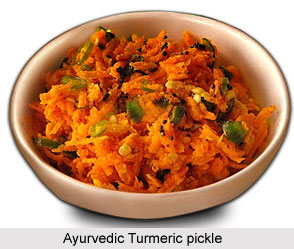 Ayurvedic turmeric pickle is a scrumptious and healthy pickle. It can be served with various Indian dishes like roti, paratha and rice. It enhances the taste of the food. The main ingredients of this pickle include fresh turmeric roots, black mustard seeds, hing, oil and pickle masala powder. However, people with Pitta prakriti, should use less hing and mustard seeds. The pickle should be served one or two teaspoons with meals. Ayurvedic turmeric pickle is easy to make and can be prepared at home.
Ayurvedic turmeric pickle is a scrumptious and healthy pickle. It can be served with various Indian dishes like roti, paratha and rice. It enhances the taste of the food. The main ingredients of this pickle include fresh turmeric roots, black mustard seeds, hing, oil and pickle masala powder. However, people with Pitta prakriti, should use less hing and mustard seeds. The pickle should be served one or two teaspoons with meals. Ayurvedic turmeric pickle is easy to make and can be prepared at home.
Ingredients of Ayurvedic Turmeric Pickle
•Three tablespoon of oil
•A cup of fresh turmeric roots
•One teaspoon of black mustard seeds
•A pinch of hing
•Two pinches of salt
•One teaspoon of pickle masala powder
Method of Preparing Ayurvedic Turmeric Pickle
•In order to prepare Ayurvedic turmeric pickle, firstly, wash and thoroughly dry the turmeric roots. Peel and finely chop it in round shape.
•Heat oil, mustard seeds and hing in a pan and stir gently until the seeds pop. Cool and pour over the chopped turmeric.
•Add the pickle masala powder and salt and stir well.
•Pour in a bottle and store in a refrigerator.
Note: It can be stored up to a month by avoiding water in the pickle as it spoils the preparation.
Benefits of Ayurvedic Turmeric Pickle
The main ingredient of this pickle which is turmeric is equipped with myriad good qualities which are beneficial for people. According to Ayurveda, turmeric is one of the best medicines. Turmeric is pungent, bitter, astringent and heating and has a pungent vipaka. It is capable of curing the whole person. Turmeric can be used by all doshas. It may stimulate vata, but doesn"t aggravate it. Some of the common benefits are as follows:
•It has tonic properties and is an antibiotic.
•It helps digestion.
•It maintains the flora of the intestine.
•It reduces gas.
•It helps to reduce anxiety and stress.
•It prevents Alzheimer"s disease
•It also prevents liver disease and cancer.
•It reduces cholesterol.
•It heals wound.
•It acts as an immune booster.
•It controls diabetes.
•It relives arthritis.




















